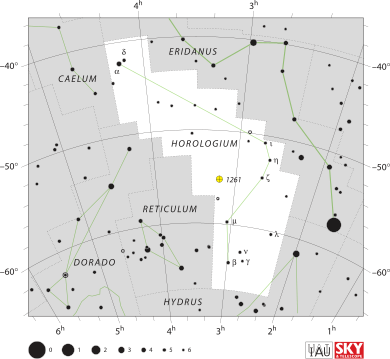Horologium (constellation) facts for kids
| Constellation | |

List of stars in Horologium
|
|
| Abbreviation | Hor |
|---|---|
| Genitive | Horologii |
| Pronunciation | genitive |
| Symbolism | the Pendulum Clock |
| Right ascension | 3 |
| Declination | −60 |
| Quadrant | SQ1 |
| Area | 249 sq. deg. (58th) |
| Main stars | 6 |
| Bayer/Flamsteed stars |
10 |
| Stars with planets | 2 |
| Stars brighter than 3.00m | 0 |
| Stars within 10.00 pc (32.62 ly) | 1 |
| Brightest star | α Hor (3.85m) |
| Messier objects | none |
| Meteor showers | ????? ????? |
| Bordering constellations |
Eridanus Hydrus Reticulum Dorado Caelum |
| Visible at latitudes between +30° and −90°. Best visible at 21:00 (9 p.m.) during the month of December. |
|
Horologium is a small constellation located in the southern sky. Its name means "the pendulum clock" in Latin. It was named by a French astronomer named Nicolas-Louis de Lacaille in the 18th century. He named many constellations in the southern sky after scientific instruments.
Contents
Exploring the Horologium Constellation
Horologium is not one of the most famous constellations, but it is still interesting to learn about. It is best seen from the Southern Hemisphere. People in the Northern Hemisphere can only see it if they are close to the equator.
Where to Find Horologium
This constellation is located near other southern constellations. These include Eridanus, Hydrus, Reticulum, Dorado, and Caelum. You can usually spot Horologium in the sky during the month of December.
Stars of Horologium
Horologium has a few stars, but none are super bright. Its brightest star is called Alpha Horologii. It is a giant star that shines with a reddish-orange light. There is also a nearby star system called GJ 1061. This system has a small, cool star and at least three planets orbiting it.
Deep-Sky Objects in Horologium
Even though Horologium is small, it contains some interesting objects far out in space. These are called deep-sky objects. One example is the spiral galaxy known as NGC 1512. It is a beautiful galaxy with long, winding arms. Close to it is a smaller, dwarf galaxy called NGC 1510. These two galaxies are actually interacting with each other.
Images for kids
See also
 In Spanish: Horologium para niños
In Spanish: Horologium para niños


